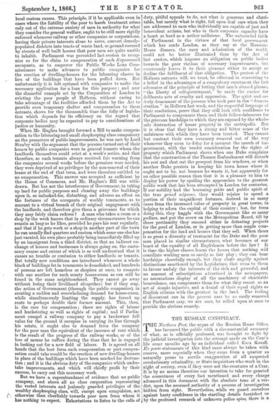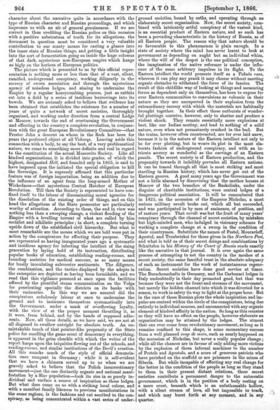THE RUSSIAN CONSPIRACY. T HE IVOrthern Post, the organ of the
Russian Home Office, has favoured the public with a circumstantial summary of what, as is officially professed, was brought to light by the judicial investigation into the attempt made on the Czar's life some months ago by an individual called Kara Kosoff. Ex parte statements of this kind must always be taken with reserve, more especially when they come from a quarter so naturally prone to servile exaggeration of all suspected revolutionary criminality, or State inquisitors who work in the night of secrecy, even if they were not the creatures of a Czar; It is by no means therefore our intention to take for granted the correctness of every fact mentioned and every charge advanced in this document with the absolute tone of a ver- dict, upon the assumed authority of a process of investigation hidden from sight. Nevertheless, while we guard ourselves against hasty confidence in the startling details furnished us by the professed research of unknown police spies, there is a
character about the narrative quite in accordance with the type of Russian character and Russian proceedings, and which impresses us with an air of general genuineness. If we are correct in thus crediting the Russian police on this occasion with a positive substratum of truth for its allegations, the document in question must be considered a very valuable contribution to our scanty means for casting a glance into the inner state of Russian things, and getting a little insight into the sort of fermentation going on inside the huge colossus of that dark, mysterious non-European empire which hangs so bigly on the horizon of European politics.
The picture which is presented to us by this official repre- sentation is nothing more or less than that of a vast, silent, ramified, underground conspiracy, working diligently in the secrecy of sworn association and through the mysterious agency of noiseless lodges, and aiming to undermine the Empire by a regular honeycombing process, just as rabbits eat into a field by a series of insidious burrowings into its bowels. We are seriously asked to believe that evidence has been obtained that establishes the existence for a number of years of quite a network of secret societies, thoroughly organized, and working under direction from a central Lodge at Moscow, towards the end of overturning the Government and effecting in the country a complete revolution, in conjunc- tion with the great European Revolutionary Committee—that Prester John a descent on whom in the flesh has been for years the professed object of all Vidocqs. Leaving aside this connection with a body, to say the best, of a very problematical nature, we come to something more definite and real in regard to the constitution of the actual Muscovite Society. Like all kindred organizations, it is divided into grades, of which the highest, designated Hell, and founded only in 1865, is said to have imposed upon the initiated the special obligation to kill the Sovereign. It is expressly affirmed that this particular feature was of foreign importation, being an addition due to the influence of an agent from the long-armed Mother of Wickedness—that mysterious Central Hatcher of European Revolution. Till then the Society is represented to have con- fined itself to the labour of disseminating moral agencies for the dissolution of the existing order of things, and on this head the allegations of the State prosecutor are particularly worthy of attention. According to these, the end in view was nothing less than a sweeping change, a violent flooding of the Empire with a levelling torrent of what are called by him socialist and nihilistic principles ; in short, a complete turning upside down of the established civil hierarchy. But what is most remarkable are the means which we are told were put in action by the conspirators for effecting their purpose. They are represented as having inaugurated years ago a systematic and insidious agency for infecting the intellect of the rising generation by laying hold of its instruction, distributing popular books of education, establishing reading-rooms, and founding societies for medical succour, as so many means for busily inoculating subversive sentiments. The diligence, the combination; and the tactics displayed by the adepts in the enterprise are depicted as having been formidable, and we read that this vigilance pounced at once upon the facilities offered by the plentiful steam communication on the Volga for penetrating specially the districts on its banks with their emissaries. In this way we are assured did the conspirators sedulously labour at once to undermine the ground and to insinuate themselves systematically into the Government, under a mask of overflowing loyalty, with the view of at the proper moment throttling it, as it were, from behind, and by the hands of supposed adhe- rents. Now, all these details, as we have said, we are not at all disposed to swallow outright for absolute truth. An un- mistakable touch of that pointer-like propensity of the State police for smelling the game scent of democracy in everything, is apparent in the grim chuckle with which the writer of the report harps upon the iniquities flowing out of the schools, and reading-rooms, and similar institutions of the Devil's creation. All this smacks much of the style of official denuncia- tion once rampant in Germany ; while it is self-evident that we have a chimera served up to us when we are gravely asked to believe that the Polish insurrectionary movement--just the one distinctly organic and national mani- festation by a Slav population—took its rise in so purely in- dividual and surface a source of inspiration as these lodges. But what does come on us with a striking local colour, and with a manifest family likeness to previous manifestations in the same regions, is the fashions and cut ascribed to the con- spiracy, as being concentrated within a vast series of under- ground societies, bound by oaths, and operating through an elaborately secret organization. Now, the secret society, com- bined with intricately artful conspiracy of the vastest kind, is an essential product of Eastern nature, and as such has been a pervading characteristic in the history of Russia, as of all Eastern people. The reason why that nature should be so favourable to this phenomenon is plain enough. In a state of society where the mind has never learnt to look at government as depending on aught but an individual whim, where the will of the despot is the one political conception, the imagination of the native reformer is under the influ- ence of the same arbitrary impulses in its flight. To the Eastern intellect the world presents itself as a Tabula rasa, whereon it can play any prank it may choose without meeting organic obstacles to withstand the force of its fancies. The result of this childlike way of looking at things and measuring forces as dependent only on themselves, has been to expose for ever Eastern communities to convulsions as volcanic in their nature as they are unexpected in their explosion from the extraordinary secrecy with which the materials are habitually brought together. In their effect these outbursts of wonder- ful plottings contrive, however, only to shatter and produce a violent shock. They remain essentially mere explosions at best, like our Indian mutiny; and lead to nothing of a solid nature, even when not prematurely crushed in the bud. But the trains, however often counteracted, are for ever laid anew, because it is in the nature of the Eastern intellect not only to be for ever plotting, but to weave its plot in the most ela- borate fashion of underground conspiracy, and with an in- tricate secrecy as wonderful as the carvings of an Eastern puzzle. The secret society is of Eastern production, and the propensity towards it indelibly pervades all Eastern nations. It can be traced through all that is most striking and most startling in Russian history; which has never got out of the Eastern groove. A good many years ago the Government was not a little alarmed by discovering that the mother houses at Moscow of the two branches of the Raskolinks, under the disguise of charitable institutions, were central lodges of a dangerous political association. It will be remembered that in 1825, on the accession of the Emperor Nicholas, a most serious military revolt broke out, which all but succeeded, and was participated in by men of eminence, of position, and of mature years. That revolt was but the fruit of many years' conspiracy through the channel of secret societies, by mistaken but high-minded men, who indulged in visionary schemes for working a complete change at a swoop in the condition of their countrymen. Substitute the names of Pestel, Mouravieff, Apostol, and Troubetzkoi for those given in the Northern. Post, and what is told us of their secret doings and combinations by Schnitzlen in his History of the Court of Russia reads exactly like the narrative in that journal. It is over again the same process of attempting to net the country in the meshes of a secret society, the same fanciful trust in the absolute adequacy of such an instrument for the work of instantaneous regene- ration. Secret societies have done good service at times. The Burschenschafts in Germany, and the Carbonari lodges in Italy undoubtedly in their day promoted good, but that was because they were not the fount and streams of the movement, but merely the hidden channel into which it was diverted for a season, to work in safety its way to light at the proper hour. But in the case of these Russian plots the whole inspiration and im- pulse are centred within the circle of the conspirators, being due entirely to individual sources, and unconnected with any organic element of kindred affinity in the nation. So long as this remains so they will have no effect on the people, however elaborate an organization may be attained by the lodges. The utmost that can ever come from revolutionary movement, as long as it remains confined to this shape, is some momentary success from a well planned coup de main, such as nearly happened on the accession of Nicholas, but never a really popular change ; while all the chances are in favour of only adding more victims by the explosion of these infernal machines to the number of Pestels and Apostols, and a score of generous patriots who have perished on the scaffold or are prisoners in the mines of Siberia. But while incapable of effecting any real change for the better in the condition of the people as long as they stand to them in their present distant relations, these secret societies contribute a permanent danger to the autocratic government, which is in the position of a body resting on a mere crust, beneath which is an unfathomable hollow, with a silent stream of lava, all but impossible to track, and which may burst forth at any moment, and in any quarter.































 Previous page
Previous page